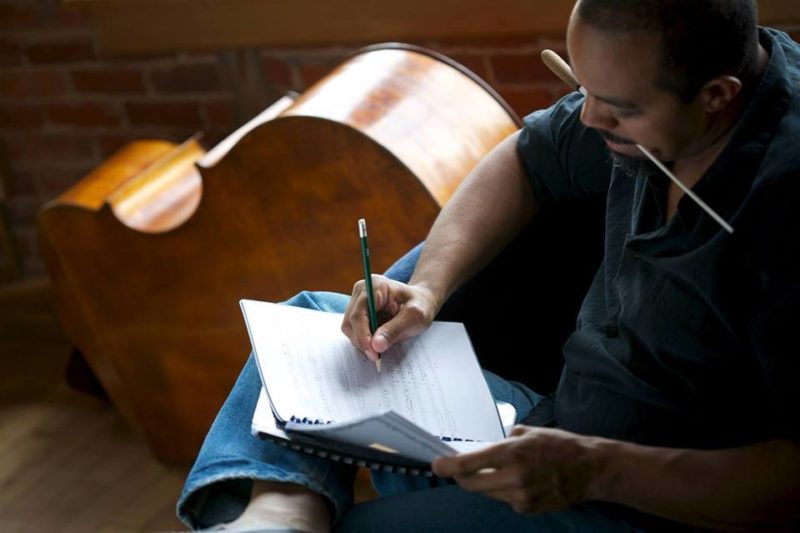
For ROCO’s 11th season opening program, the musical powers that be chose composer and bassist Rick Robinson for the orchestra’s 44th commission.
The work, titled “Gitcha Groove On!” is a jazz-infused classical commission for the full orchestra plus trapset, the product of ROCO winning the New Music Box and ASCAP “Music Alive” Partnership award.
Read on to get to know Robinson and his approach to composition.
Q: What do you think are the biggest barriers for a non-classical music listener to attend a classical music concert?
A: I believe the biggest barrier is that there’s no host to guide and interact with the audience. They can’t meet the musicians who remain backstage, and, quite frankly, the veteran audience can be somewhat intimidating about dress, talking and clapping.
Classical music is an overwhelming world of information to jump into, especially since there’s no immediate context for the newbie. Because the music is mostly instrumental, new concert-goers generally don’t bother with program notes or pre-concert lectures. And let’s face it, most Americans are not used to listening internally in the spirit of meditation as we do in the concert hall.
But once we bring it up, the concept then becomes acceptable. If the musicians aren’t curious about their audience, the audience won’t be curious about the musicians.
In addition, the veteran audience forms the front lines in the battle for new listeners, who will be uncomfortable sitting shoulder-to-shoulder, browbeating, shushing, feeling out of place, unwelcomed or underdressed, and making any mistake like clapping at the wrong time. Our profession has been just as demanding on the audience as the musicians. We need audiences to act as greeters and gently inform newbies that they are like family.
Q: For you, what came first: performance or composition? Or did you develop those skills simultaneously? Does performing give you insights into composition and viceversa?
A: Performance definitely inspired me to arrange and then compose; having played enough new and older works to understand the psychological principals behind melody, harmony, silence, counterpoint, development and more.
With written music, we can set up an extended adventure in sounds. Voice adds a tremendous amount of empathy, but I’m not quite ready to go there yet. As it is, we sing and dance through our instruments anyway. I just try to write the kind of music I like to play most — with drive, direction, drama, plus lots of emotional tension and release, with echoes of themes that build to a real catharsis, like my favorite works by Schubert, Brahms and Dvorak.
Q:. Tell us about the piece you wrote for ROCO: How do you infuse pop into classical music?
A: Once I discovered I could introduce a pop groove in my music as a contrast to classical styles, I imagined this adventure of a classical musician going clubbing, looking for a dance groove on par with the catharsis he finds in a Brahms symphony.
So, our protagonist hits the corner bar, where a tribute band is playing something like Crimson and Clover over and over. Next, he goes into a blues bar, where the band turns wild with rockabilly! Then, he finds his goal at the next club with a pseudo salsa during which the musicians take solos. Between each club, our hero reflects on music history, including the role of the blues third and the gypsies on music. He even has a musical fantasy before going into the last place. Coming out of the final stop, he reflects deeply on his fortune to be able to enjoy a broad variety of music before walking home with his own groove.
Q:. Any recognizable themes? Any listening tips you could share?
A: While there are a few direct quotes in “Gitcha Groove On!” the variations on the main theme are meant to feel like famous music. For example, in the rock club, the tune becomes overplayed like Crimson and Clover over and over. In the blues club, I imagine the lyrics (and I hear Dr. John singing them) “Well dere’s a new style comin’; dey callin’ it da rhythm and blues.”
Between clubs, there are famous but subtle folk references like a gypsy flourish, La Cucaracha and a very common country music cadence that “y’all” should recognize. Plus there are classical references from Mozart’s Requiem and Wagner’s Das Rheingold.
It will be tempting to watch the orchestra and conductor exaggerate these constant dramatic shifts. The urge to dance will be strong at times, especially since I have a drummer on this one. But since classical music normally subjugates personality in favor of the music alone, I normally recommend closing our eyes to “imagine the movie of the music internally.”
Q: If you hadn’t chosen the bass as your primary instrument, what other instrument do you gravitate toward?
A: Well, I played cello before I took up bass. Often I wish I had stuck with cello.
In my next life I want to be a violist! Ultimately, I’m delighted I was able to master the bass. From such focus came everything else. However, I do also conduct and enjoy chances to prove it. I have no keyboard skills to speak of. In a way, with what I’m doing now, composing and arranging, I like to believe I have gravitated to playing music notation software at a high level.
___
The River Oaks Chamber Orchestra presents “Gitcha Groove On!” on Sept. 26-27 at The Church of St. John the Divine and at Miller Outdoor Theatre.

Leave A Reply